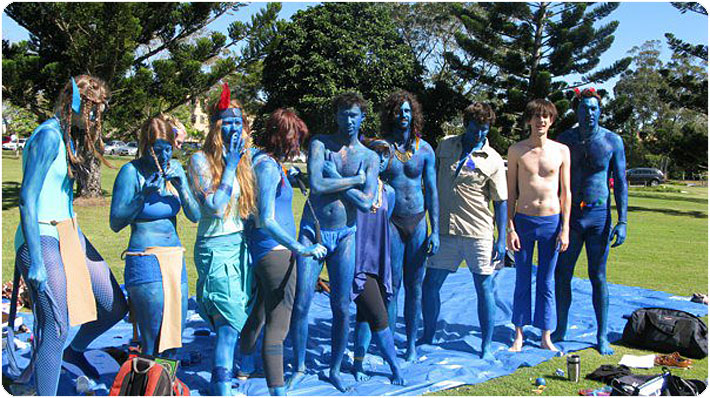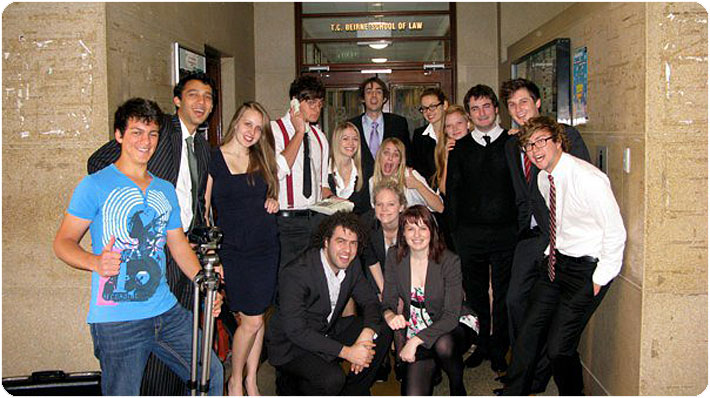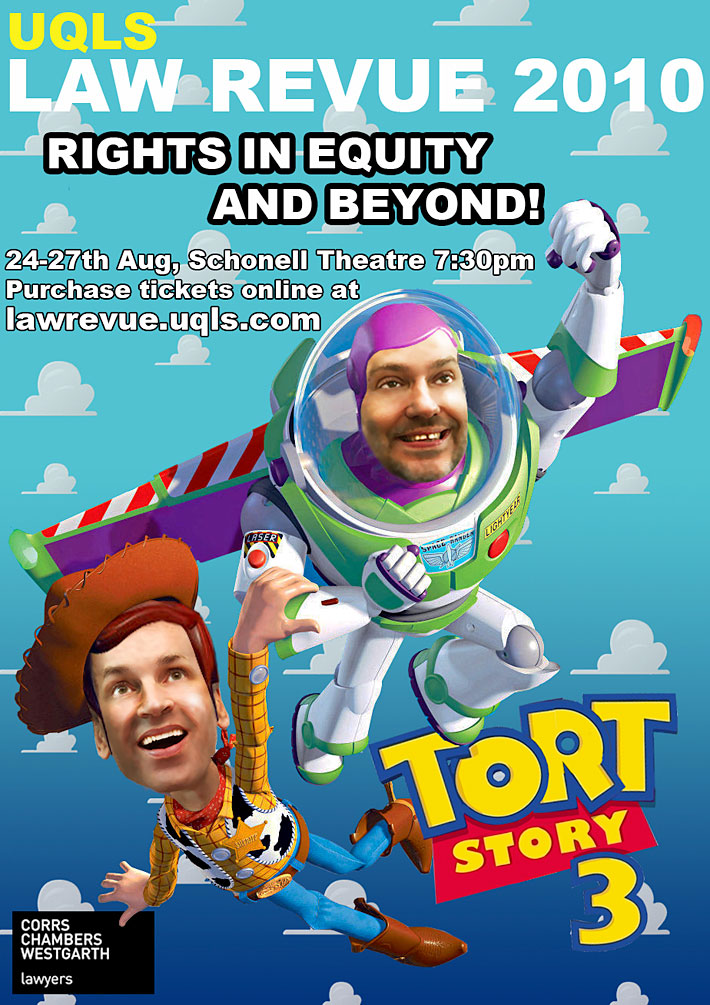When the Hon. M. D. Kirby, A.C., C.M.G. promotes the University of Queensland Law Revue as the best in Australia, his endorsement is a judgment which brooks no dissent. A certain degree of bias, however, may be apprehended for his relationship with the Law Revue is very close. Kirby J. (as he then was) opened the 2004 production with a pre-recorded cameo appearance and, in 2006, he shot a skit in the moot court where he revealed his abiding friendship with and profound admiration for the late Rt. Hon Sir. H. T. “Bill” Gibbs, G.C.M.G., A.C., K.B.E. (in whose honour that courtroom is named) to his cast-mates in a touching, impromptu tribute to the great man.
His fondness for the Revue has been consistently reciprocated. This year, the ladies of the company, swing-skirted and bobby-socked, proclaimed their love for him in a parody of Rick Springfield’s 1981 single, Jessie’s Girl, to which the otherwise underutilised Matt Hendry, emerging as Kirby from a judicial chorus line provided by the boys in black gowns and long wigs, contributed some pyrotechnically staged guitar showmanship. At times, his flare came worryingly close to his costume but it made a nice change from having Kirby’s character troop a rainbow flag across the boards.

Evelyn Peter’s choreography in this number and throughout the production was outstanding. She combined simple steps, which her dancers executed ably, very effectively. Her puppeteer invigilators in the examination room peripety of Stop Writing set to a reworking of Muse’s 2005 single, Glorious, were a highlight as was the show’s opening number, Let’s Drop a Subject Again, which even included, in a delightful homage to its antecedent, a tap sequence. The androgynous costuming for this scene — white poet shirts worn over black stovepipes with cropped black waistcoats and bow ties — also subtly referenced the Rocky Horror Show very nicely.
 Donny Mourginos, the Convenor of the Revue this year, attacked his part in the number with appropriate abandon. His delivery and timing have improved over his years in the Revue and he gave big performances to justify his many other appearances throughout the production. He transformed Avenue Q’s Brian into an unemployed U.Q. graduate and, as James Cameron, he extolled in song the virtues of Avatar. This film seems to hold considerable fascination for the students. It provided the theme for [2010] 1 Obiter and, in the Revue, the subject of a further spoof and the context for a skit based on the activities of the Na’vi Students’ Society.
Donny Mourginos, the Convenor of the Revue this year, attacked his part in the number with appropriate abandon. His delivery and timing have improved over his years in the Revue and he gave big performances to justify his many other appearances throughout the production. He transformed Avenue Q’s Brian into an unemployed U.Q. graduate and, as James Cameron, he extolled in song the virtues of Avatar. This film seems to hold considerable fascination for the students. It provided the theme for [2010] 1 Obiter and, in the Revue, the subject of a further spoof and the context for a skit based on the activities of the Na’vi Students’ Society.
Mourginos made a confronting Kit Barker in the staff skit and, in an extraordinarily physical performance, a manic, “three-dimensional” solicitor. He played the victim of a bowel-loosening electrocution in an unfunny and overlong sketch which belonged more in the Cement Box than in the Schonell Theatre where the Law Revue has played a sell out run of four nights every year since 2005. The show would have benefited if a number of weak skits had been pruned altogether and tighter editing of the others had overcome a tendency to meander on self-indulgently, labouring jokes which had already been made.
Jack Fisher can still seem a little bit stiff at times but he inhabited the part of the smug graduate solicitor opposite Mourginos’ applicant in an interview where the participants smilingly told each other the unpleasant truth. Ffion Whaley was equally impressive as the firm’s saccharine human resources dragon. This sketch demonstrated the value of writing from experience. The quest for clerkships now, alas, consumes students but this picture of the interview process was all the funnier for its frightening accuracy. The misery of life in a firm was also fodder for a sketch but it did not ring quite as true. Like the “stage parson” in Chesterton’s Vampire of the Village (1936) who was all mixed up about the Anglican controversies, Liz Talbot’s managing partner displayed a grab bag of nasty but inconsistent traits. The writers have certainly struck soulless solicitors but they have not yet had to observe one closely enough to get inside her skin.
Nevertheless, the sketch reinforced the impression that the students don’t really love the law. Theatrical types may chafe a bit under the yoke and, no doubt, they play this up as a useful comedic conceit but no acknowledgement that law is fun was ever set off against it. The late Hon. P. D. Connolly, C.B.E., C.S.I., no square, once humorously likened a legal profession to the having of an abiding interest in crosswords which one was paid more than adequately to solve. If the Law Revue offers an authentic insight into the students’ worldview, there are troublingly few puzzlers among them.
The writers are, however, cricket aficionados who offered note perfect commentary (complete with telestration) on mores at the Forgan Smith building’s coffee shop. Still close to home, Lectopia perceived, in something of a student policy reversal, the dangers of relying on lecture recordings. Jo Sri brought the verve of Johnny Depp to his rôle as this skit’s pirate saviour. LLB on a Budget was a vehicle for Sri’s considerable hip-hop ability but the song’s tail twisted to make a telling admission against interest about spending priorities and holidays abroad. His sensitive interpretation of Norman the mature-age student in Last JD recalled the pathos of Sandy Stone, an affect which Sri also brought to his portrayal of a shambolic Suri Ratnapala.
As a Minister of the Crown in Filtered Alex Forrester would have earned the approval the late Paul Eddington, C.B.E.. but his star turn came channelling Andreas Schlönhardt in a rôle which he has made his own over the past few years. James Schlunke’s equally uncanny and long-standing impression of a huggable Russell Hinchy comes as a complete contrast to the hilarious heights of Forrester’s campery: these characters are now, if anything, even better than the real thing.
Julia Gillard’s distinctive speech pattern, vowels and mannerisms were exquisitely captured by Brianna Lee beneath a crimson pageboy helmet. Opposite her, Dan Wyatt, clinging to the captaincy of the netball team as Kevin Rudd, did well but his overly kind impression needed more of a purse-lipped pout to be truly convincing. Unfortunately, other, minor characters were often played with quasi-American accents seemingly to signal they were comic creations.
Under the baton of new musical director, Luke Trimarchi, the orchestra was excellent. At the piano, Trimarchi also proved a pleasing accompanist, especially in the amusing Facebook Date scene. A worthy successor to the extraordinary Arthur Abal has been found. Marita Rigby impressed on debut but, in general, the singing on opening night was, perhaps, not quite up to the standard of the playing.
Although this year’s production fell slightly short of the level of excellence set by last year’s show, Kirby’s assessment remains the view of the majority.
Andrew Curtin








 Donny Mourginos, the Convenor of the Revue this year, attacked his part in the number with appropriate abandon. His delivery and timing have improved over his years in the Revue and he gave big performances to justify his many other appearances throughout the production. He transformed Avenue Q’s Brian into an unemployed U.Q. graduate and, as James Cameron, he extolled in song the virtues of Avatar. This film seems to hold considerable fascination for the students. It provided the theme for [2010] 1 Obiter and, in the Revue, the subject of a further spoof and the context for a skit based on the activities of the Na’vi Students’ Society.
Donny Mourginos, the Convenor of the Revue this year, attacked his part in the number with appropriate abandon. His delivery and timing have improved over his years in the Revue and he gave big performances to justify his many other appearances throughout the production. He transformed Avenue Q’s Brian into an unemployed U.Q. graduate and, as James Cameron, he extolled in song the virtues of Avatar. This film seems to hold considerable fascination for the students. It provided the theme for [2010] 1 Obiter and, in the Revue, the subject of a further spoof and the context for a skit based on the activities of the Na’vi Students’ Society.

